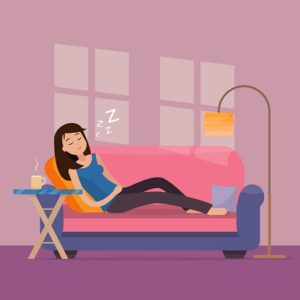 Do you ever get drowsy or tired after lunch? If so, you are not alone. The physical lack of energy you get after overeating is so common it has actually been given a scientific term. “Sugar crash” is used to define what happens to you after consuming too many carbohydrates and sugars.
Do you ever get drowsy or tired after lunch? If so, you are not alone. The physical lack of energy you get after overeating is so common it has actually been given a scientific term. “Sugar crash” is used to define what happens to you after consuming too many carbohydrates and sugars.
And, since many modern day lunches are packed with those two components, you can often times “crash” after your midday meal.
Giving your body too many carbohydrates and too much sugar to process at one time can spike your blood glucose levels. This signals a surge of insulin production and secretion. Glucose in sugar and carbohydrates is absorbed by your tissues and used for energy production or stored as glycogen.
When you eat too many carbs and too much sugar, the drop in your blood glucose level after that food is processed is known as the sugar crash.
How can you defeat this seemingly natural process? After all, you do have to eat every day don’t you? The answer is in changing behaviors. All around the world modern societies are taught to eat 3 basic meals throughout the day – breakfast, lunch and dinner. But you should actually spread your daily calorie intake out over 5 or 6 small eating sessions.
And if you get up late or do not eat breakfast for some other reason, by the time lunch rolls around you are ravenous. You overeat, too much sugar and too many carbohydrates attack your system, your blood sugar level spikes and you feel energized for a short period of time. But as those blood sugar levels return to normal you crash, and hit those 2 PM to 3 PM blues. Fortunately, there are some simple solutions.
To beat the post-lunch sugar crash make sure you eat breakfast every day. And make protein a part of that breakfast. When you eat protein to start your day, it takes longer to process and be sent out to your system. This makes you naturally eat less food throughout the day. This can keep you from overeating at lunch, and suffering a crash in the afternoon.
You can also defeat the sugar craving that can lead to a crash by avoiding energy drinks, which are packed with almost comical amounts of sugar. Keeping hydrated throughout the day with water and other non-sweetened drinks will also help you avoid the afternoon sugar crash.
If your post-lunch activities include sitting for extended periods of time, get up and stretch, run in place, perform jumping jacks or exercise in some other way. This helps your body burn those extra calories and carbs you ate at lunch, and can keep you from crashing and burning in the afternoon.






